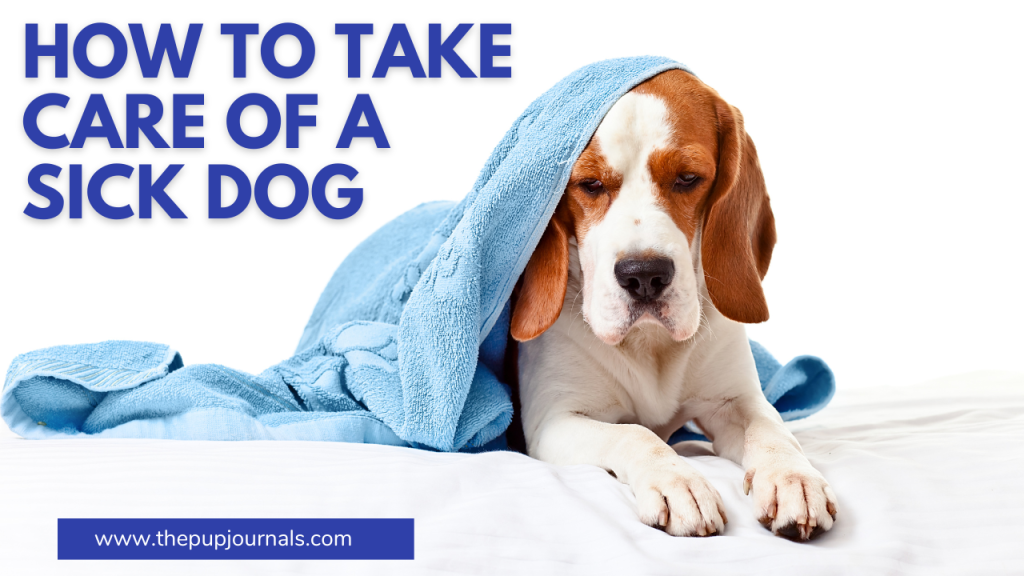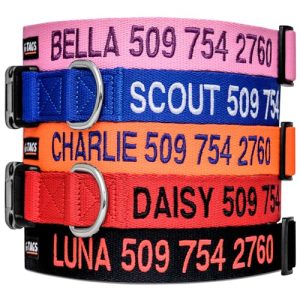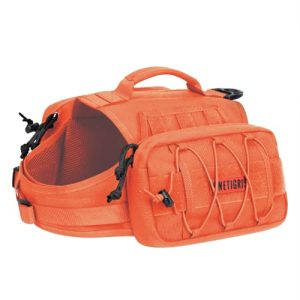When your dog is sick, it can feel overwhelming and scary. You want to help your furry friend get better as quickly as possible, but you might not know where to start.
Taking care of a sick dog requires patience, care, and the right knowledge. You’ll discover simple and effective steps to comfort your dog and support their recovery. Keep reading to learn how to make your dog feel safe and loved during this tough time—and how you can be the best caretaker your pet needs.
Recognize Signs Of Illness
Knowing when your dog is sick helps you act quickly. Dogs can’t tell us how they feel. Watching for signs is very important.
Illness in dogs shows in many ways. Some signs are easy to miss. Learn what changes to look for in behavior and body.
Behavioral Changes
Sick dogs often act differently. They may seem tired or less interested in play. Watch for these common behavior changes.
- Less energy than usual
- Hiding or avoiding people
- Loss of appetite
- Increased irritability or aggression
- Excessive whining or barking
- Changes in sleep patterns
Physical Symptoms
Look closely for physical signs that show your dog is unwell. Some are easy to see, others require a careful check.
| Symptom | What to Watch For |
| Coat Condition | Dull, dry, or patchy fur |
| Eyes | Redness, discharge, or cloudiness |
| Nose | Dry, cracked, or runny |
| Mouth | Bad breath, drooling, or sores |
| Breathing | Heavy panting or coughing |
| Movement | Limping or stiffness |
| Body Temperature | High or low temperature |
When To See A Vet
Some signs mean you should take your dog to the vet right away. Quick care can prevent serious problems.
- Persistent vomiting or diarrhea
- Difficulty breathing or blue gums
- Severe bleeding or wounds
- Sudden weakness or collapse
- Seizures or shaking
- Refusing to eat or drink for over 24 hours
- Swollen or painful abdomen
Create A Comfortable Space
When your dog feels sick, creating a calm and cozy area helps them heal. A quiet space with proper comfort lets your dog rest well.
Focus on three key parts: a quiet resting area, good temperature control, and soft bedding. Each part adds to your dog’s comfort and recovery.
Quiet Resting Area
Choose a calm spot away from loud noises and heavy foot traffic. This helps your dog feel safe and relaxed. Keep the area clean and free of distractions.
Temperature Control
Keep the room at a steady temperature that is not too hot or cold. Sick dogs can be more sensitive to weather changes.
- Use a fan or heater to adjust the temperature gently.
- Close windows during cold or hot weather.
- Check your dog often for signs of discomfort.
Soft Bedding
| Type of Bedding | Benefits |
| Memory foam mattress | Supports joints and eases pain |
| Soft blankets | Provides warmth and comfort |
| Washable covers | Keeps bedding clean and fresh |
Make sure the bedding is easy to clean. Change it often to keep your dog’s space hygienic and cozy.
Manage Medication And Treatment
Caring for a sick dog requires attention to medication and treatment. It is essential to follow guidelines to ensure your dog's recovery.
Proper administration of medicine and monitoring of side effects are crucial for your pet’s health. Let’s explore how to manage these tasks effectively.
Administering Medicine Safely
Giving medicine to a dog can be tricky. It is vital to ensure your dog takes the correct dose at the right time.
- Hide pills in treats if your dog refuses them.
- Use a pill dispenser for liquid medications.
- Always check the expiration date on medications.
Following Vet Instructions
Vets provide specific instructions for your dog’s treatment. Adhering to these guidelines is crucial for effective recovery.
| Instruction | Importance |
| Dosage | Ensures correct treatment |
| Timing | Maintains medication effectiveness |
| Diet | Supports recovery process |
Monitoring Side Effects
Observe your dog for any unusual behavior after administering medication. Side effects may vary depending on the treatment.

Credit: www.houndsy.com
Provide Proper Nutrition And Hydration
Taking care of a sick dog means paying close attention to their food and water. Proper nutrition helps them heal faster.
Hydration is just as important. A sick dog needs enough fluids to stay strong and avoid dehydration.
Feeding Sick Dogs
Sick dogs often lose their appetite. Offer small, frequent meals to make eating easier for them.
Choose soft and bland foods. These foods are gentle on the stomach and easier to digest.
- Cooked chicken or turkey without seasoning
- Boiled rice or plain pasta
- Special wet dog food for sensitive stomachs
Encouraging Fluid Intake
Keep fresh water available at all times. Dogs may drink less when sick, so encourage them gently.
You can offer ice cubes or dilute low-sodium broth to make fluids more appealing.
- Change water often to keep it fresh
- Use a clean bowl to avoid germs
- Try offering water with a syringe if the dog won’t drink
Special Dietary Needs
Some illnesses require special diets. Your vet can suggest the best food for your dog’s condition.
These diets may have extra nutrients or avoid certain ingredients to support healing.
- Low-fat diets for dogs with pancreatitis
- High-fiber foods for digestive issues
- Prescription diets for kidney or liver problems
Maintain Hygiene And Cleanliness
Keeping a sick dog clean helps them recover faster. It also stops germs from spreading around your home.
Proper hygiene protects both your dog and family. Focus on cleaning bedding, grooming, and infection prevention.
Cleaning Bedding And Surroundings
Wash your dog's bedding often to remove dirt and germs. Clean the area where your dog rests daily.
- Use hot water and pet-safe detergent for bedding
- Disinfect floors and nearby surfaces regularly
- Remove any soiled or wet materials quickly
- Ventilate the room to keep air fresh
Grooming Tips For Sick Dogs
Gentle grooming helps your dog feel better. It also prevents skin problems and keeps fur clean.
| Grooming Task | Tip |
| Brushing | Use a soft brush and avoid hurting sensitive areas |
| Bathing | Use lukewarm water and mild pet shampoo |
| Nail Trimming | Trim nails carefully to avoid bleeding |
| Ear Cleaning | Wipe ears gently with a damp cloth |
Preventing Infection
Stop infections by keeping your dog’s environment clean and dry. Wash your hands after care.
- Change gloves if you use them during care
- Use separate towels for your dog
- Keep food and water bowls clean every day
- Check wounds or sores for signs of infection

Credit: www.holistapet.com
Monitor Recovery Progress
Taking care of a sick dog requires careful watching to see how they get better. Monitoring recovery helps catch problems early and keeps your dog safe.
Keep notes and observe your dog daily. This way, you know if treatments work or if you need to change the care plan.
Tracking Symptoms
Write down any symptoms your dog shows. Look for changes in eating, drinking, energy, or bathroom habits. Also note coughing, vomiting, or limping.
- Record the type of symptom
- Note when it started and how often it happens
- Check if symptoms get better or worse
- Share this information with your vet
Adjusting Care As Needed
Change your dog’s care based on how they respond. If they eat more, you can offer more food. If they seem tired, let them rest more.
| Care Aspect | Signs to Adjust | How to Adjust |
| Feeding | Less appetite | Offer smaller, frequent meals |
| Exercise | Low energy | Shorter, gentle walks |
| Medication | Side effects | Consult your vet for changes |
| Rest | Restlessness | Provide a quiet, comfortable place |
Recognizing Warning Signs
Know the signs that need quick vet help. These include severe vomiting, trouble breathing, or sudden weakness.
- Continuous vomiting or diarrhea
- Difficulty breathing or rapid breathing
- Loss of consciousness or seizures
- Swelling or severe pain
- Refusal to eat or drink for over 24 hours
Offer Emotional Support
When your dog is sick, emotional support is essential. It helps them feel safe and secure.
Being there for your pet can aid in their recovery. Your attention can make a big difference.
Comforting Your Dog
Comfort helps your dog relax during tough times. Create a cozy space for them to rest.
- Place their bed in a quiet area
- Use soft blankets for warmth
- Gently pet them to show you care
Reducing Stress
Stress can slow down recovery in dogs. Keep their environment calm and soothing.
| Tip | Benefit |
| Play soft music | Calms nerves |
| Avoid loud noises | Prevents anxiety |
| Stick to a routine | Gives stability |
Bonding Activities
Engaging in bonding activities strengthens your connection. Simple activities can cheer up your sick dog.

Credit: www.petscare.com
Frequently Asked Questions
How Do I Know If My Dog Is Sick?
Look for signs like lethargy, loss of appetite, vomiting, diarrhea, coughing, or unusual behavior. Monitor your dog closely and consult a vet if symptoms persist or worsen.
What Should I Feed A Sick Dog?
Feed bland foods like boiled chicken and rice in small amounts. Avoid rich or fatty foods until your dog recovers. Always provide fresh water to keep them hydrated.
When Should I Take My Dog To The Vet?
Visit the vet if symptoms last more than 24-48 hours, worsen, or if your dog shows difficulty breathing, severe pain, or unconsciousness. Early diagnosis is crucial for recovery.
How Can I Make My Sick Dog Comfortable?
Provide a quiet, warm, and clean resting area. Offer gentle care, avoid stress, and maintain regular feeding and medication schedules as advised by your vet.
Conclusion
Caring for a sick dog needs patience and gentle care. Watch your dog closely for any changes. Give medicine on time and keep your dog comfortable. Always provide fresh water and healthy food. Rest is very important for your dog’s recovery.
Don’t hesitate to ask a vet for advice. Small steps can help your dog feel better. Love and attention make a big difference. Your care helps your dog heal faster and stay happy.

Emily Barker is the founder of ChillDogLife.com, a space dedicated to helping pup parents discover the best dog products, lifestyle tips, and cozy ideas for happier homes.
A lifelong dog lover, Emily combines her passion for pets with a knack for research to share trusted recommendations on everything from toys and furniture to health and everyday care.
Her goal is simple: to make life easier, stylish, and more joyful for dogs and the people who love them.







